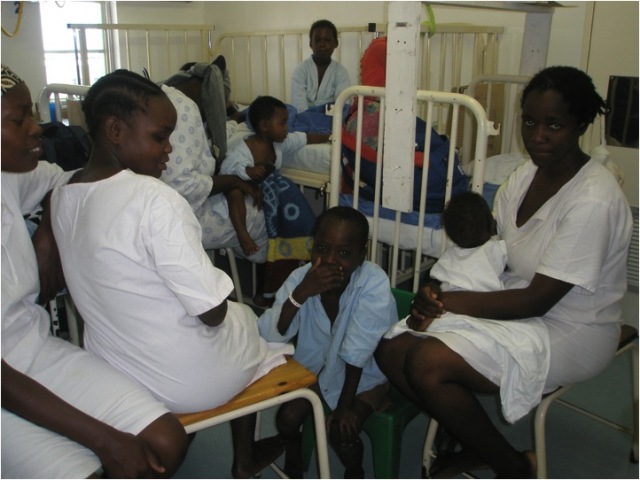When violence erupted in the Central African Republic three years ago, hundreds of thousands of people fled the capital Bangui, including most doctors and medical students at the main children’s hospital.
As the city descended into chaos, 58-year-old Jean Gody was one of the few doctors who chose to stay behind and help.
“I would have been ashamed to leave people suffering and then have to come back and look them in the eyes,” the hospital director told the Thomson Reuters Foundation in an interview.
“That would have been too tough for me – I could not have lived with myself,” Gody said, sitting among stacks of files and paperwork in his office, where a photo of him with Pope Francis – who visited the country last year – commands pride of place.
Central African Republic, one of the world’s most chronically unstable countries, suffered the worst crisis in its history in early 2013 when mainly Muslim Seleka fighters seized power, triggering reprisals by Christian anti-balaka militias.
Gody and three other doctors, who also stayed behind, kept the hospital open as the violence spiralled but were quickly overwhelmed by the number of patients.
“There were a lot of people wounded by bullets – we almost forgot the other illnesses,” Gody said, adding that up to 30 children with bullet wounds arrived every day in the first week.
“Later, we saw both bullet and machete injuries, also involving children, and people started coming in with injuries from bombing that needed amputations.”
Once aid agencies started increasing their presence in Bangui after the initial bloodshed, the health response became more organised, Gody said. Two organisations took control of the trauma ward and malnutrition unit in the children’s hospital.
“That’s how we coped, given our limitations and our needs.”
DOCTORS’ DUTY
Reflecting on his worst moment as a doctor during the conflict, Gody recalls a woman who came to the hospital with her sister and son after being caught up in the bombing of a church.
“Her child was really, really injured in both legs and was bleeding a lot, and her sister died really quickly,” Gody said.
When the woman saw armed rebels arrive in front of the hospital, she wanted to fight them with her bare hands, he said.
“I just had the reflex to stop her, telling her: ‘You need to save your energy to take care of your child’,” the doctor said, adding that he later had to amputate the child’s feet.
The violence has subsided slightly this year compared to last year, yet a fifth of the population is still displaced, hunger and malnutrition rates have rocketed and many health facilities are empty, damaged, or destroyed.
Gody says the situation is more manageable than it was before but the children’s hospital is still operating with only half the number of doctors it had before the conflict.
“It is so difficult, it is a challenge,” he said. “We have to work a lot, to be so involved, physically and mentally.”
The father-of-four’s decision to stay in the country even cost him his marriage, as his wife decided to move to the United States with their children when the violence broke out in 2013.
“But I studied here at the university – my country made me who I am. I am accountable to my country so I must give that back by helping the children and their parents,” Gody said.
Urging other medical professionals to return to the Central African Republic, Gody said it was their duty to help their people and do something for their country.
“To other doctors around the world who think they have something to give, we have space here, we have jobs here.”

